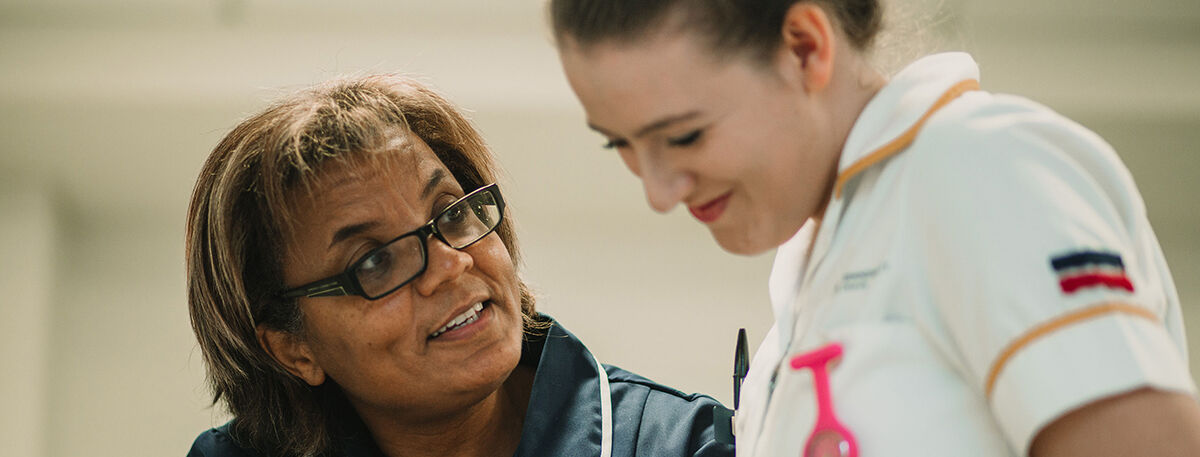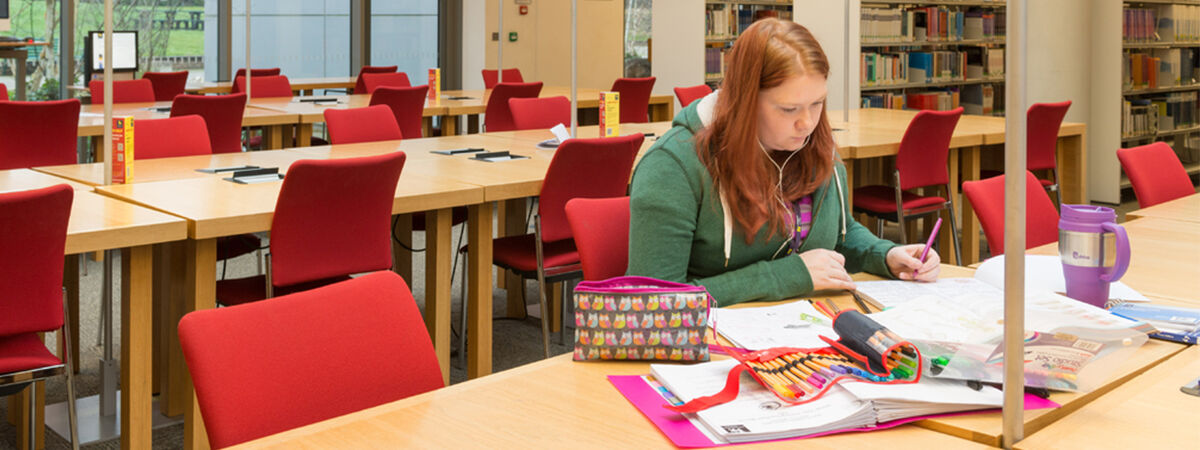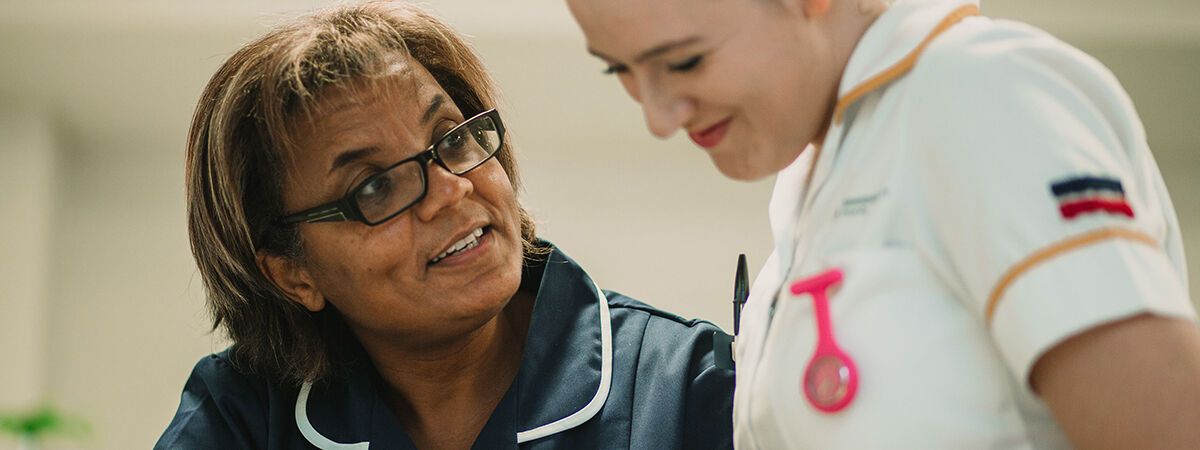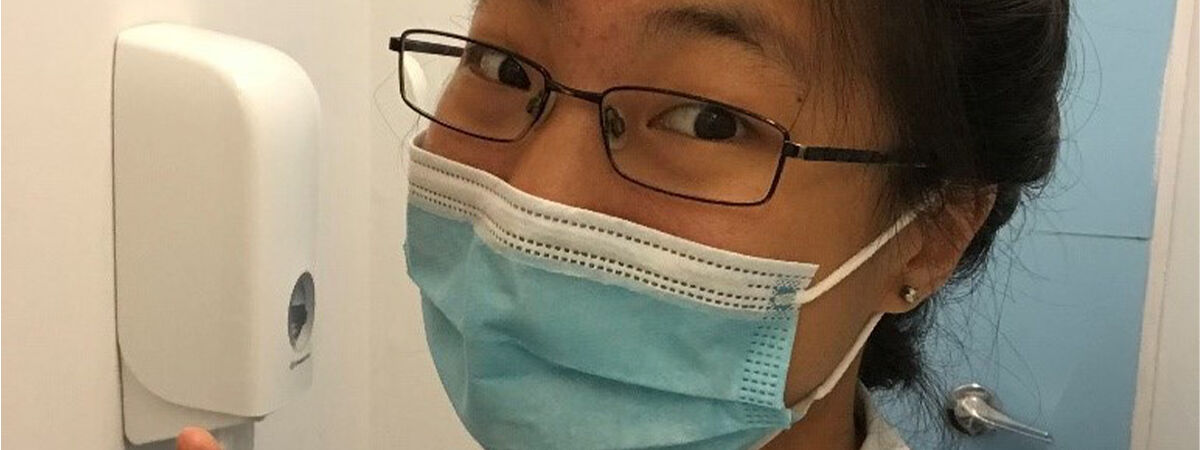Choosing your degree subject and university is a big decision. We’re sure you have lots of questions about everything from the social life to where you’ll go on placement. Our Open Days are the ideal opportunity to get answers to these questions from our academics, and get an insight into university life from our current students.

At the Virtual Open Day, you can join live sessions about the Students’ Union, Student Support, Admissions and more, as well as a specific Q&A session for your subject area. To help you find out more about our courses, we’ve brought together answers to some of the questions we get asked most often at Open Days. For anything that isn’t covered, or if you would like more detail, please tune in to our live Q&A session for Nursing.General course information.
General Course Information
What are the entry requirements?
For all our Nursing courses, you will need to have level 2 qualifications in Maths and English (GCSE or Functional Skills).
In addition, you will need level 3 qualifications, which vary depending on which course you apply for:
- FdSc Nursing Associate: Level 3 Health and Social Care (or equivalent)
- BSc (Hons) Nursing, and BSc (Hons) Registered Nurse Degree Apprenticeship (Adult, Child, Mental Health and Learning Disability fields): 120 UCAS points
- MSci Nursing Dual Award: 128 UCAS points
- MSc Nursing (pre-registration): 2:1 degree in health or related subject. For this course, you will also need evidence of formal care experience.
You can find full details of entry requirements on the relevant course pages.
What is the selection process?
Applicants to all Nursing courses are required to successfully complete an interview before being offered a place on the course. You may be asked to respond to a scenario or case study, or answer questions submitted by real service users. The interview helps us to assess whether the course is the right fit for you. It is also your opportunity to think about why you want to pursue a career in Nursing.
For further information about the process, visit our interview guidance page.
Does the course have exams?
Some modules are assessed by exam. We aim to offer a range of assessments so that everyone has a chance to excel. Assessments for Nursing are a mixture of written exams, coursework and in-person activities.
Are there any international opportunities?
Yes, our HELS Go Abroad scheme gives Nursing students the opportunity to access international experiences to enrich your studies. Please be aware that the current COVID-19 pandemic may affect this.
Funding and support
Am I entitled to any extra funding?
Yes, for courses starting after September 2020, there is funding of at least £5,000 a year available for students of all four fields of Nursing. This is available to students on the BSc, MSci and MSc (pre-registration) Nursing courses. This is not means tested and does not have to be paid back. Find out more about funding.
I will be a mature student, is this course suitable for me?
Yes, mature students are actively welcomed to join our courses and enter the nursing profession. We particularly value the wealth of transferable skills that you will bring to the course and profession. Our Student Support staff, including a dedicated child care adviser, can offer advice and information on managing your studies alongside your existing commitments.
Find out more about childcare and funding support
Want to become a nurse?
Kevin Crimmons, Head of the Dame Edith Cavell Department of Adult Nursing tells us why nurses are so key to the wellbeing of the nation.
Placements
What are placements like?
There is an even split between theory and practice-based learning on our Nursing courses, and placement experiences are a key part of your learning. Practice placements will be specific to your field (Adult, Child, Mental Health or Learning Disability) throughout the three years. There will also be opportunities for experiences across the four fields of nursing. While on placement, you will be supported, supervised and assessed by suitably prepared staff at the university and in your placement organisation to develop your knowledge and skills.
Placements will include shift work and unsocial hours.
Hear what our students have to say about placement
Where will placements be located?
Placements may be within community, hospital or home environment settings and at a location anywhere within the West Midlands region and beyond.
Will I be provided with uniform?
At the start of the course you will receive either three or four sets of BCU uniform, free of charge. This will usually be tunics and trousers. If you’re a Learning Disability Nursing or Mental Health Nursing student, whether you’re required to wear a uniform during a placement will depend upon the environment you’re going into but you will be issued with uniform as there will be occasions when you need to wear it. You will also be issued with a name badge with your full name. If you want to buy additional uniform items they’re usually around £10 per item.
Further information about uniform and what you need to wear on placement
Facilities
What facilities are available to Nursing students?
The School of Nursing and Midwifery offers a range of specialist facilities to give our students the ability to explore, learn and develop within every aspect of their speciality. Our specialist spaces include mock wards, home environment room, and skills practice and care enhancement (SPACE).
We have several Simulation men (SIM men) and Simulation babies (SIM babies) which are anatomically correct manikins used for teaching specific techniques such as advanced adult and paediatric life support skills, acute and high dependency clinical skills, first aid and communication skills.
What is SPACE?
SPACE (Skills Practice And Care Enhancement) is an innovative practice area that students can access outside of lecture time to use equipment and resources to practise a wide range of skills in a safe, welcoming and supportive environment.
Students can practise over 100 skills procedures students at their own pace in preparation for assessment or placement.

Course specific questions
What is a Nursing Associate?
The Nursing Associate is a bridging role between health and care assistants and graduate registered nurses. Nursing Associates are new members of the care team, who are trained to foundation degree level. They work with people of all ages and in a variety of settings in health and social care e.g. adult, children’s, learning disabilities and mental health.
What’s the difference between a registered nurse and a nursing associate?
Both Nursing Associates and Registered Nurses are accountable professionals who are responsible for promoting health and preventing ill health, as well as improving the safety and quality of care. Nursing Associates provide and monitor care, contribute to integrated care and help with assessing needs and planning care. Registered Nurses evaluate, lead, co-ordinate and manage nursing care.
How do I apply for an apprenticeship course?
This is a work based apprenticeship supported by your employer. There is currently no direct entry to this course – you will need to apply through your employer.
Find out more about our Apprenticeships at our Q&A session (link to Apprenticeship Open Day page)
What’s the different between the BSc Nursing Degree Apprenticeship and the direct entry degree?
With the nursing apprenticeship you must already be in employment, usually with one of our local NHS trusts or other large healthcare provider. This is because apprenticeships are ‘employer led’.
Find out more about the differences between the Nursing degree and degree apprenticeship
What is the MSc Nursing (Pre-registration)?
Our accelerated MSc in Nursing will give you the opportunity to qualify as a registered nurse in two years. The course is aimed at people who already hold an undergraduate degree in a health or science related subject, and also have some prior experience in a care setting. You can complete the MSc in one of our four fields of Nursing – Adult, Child, Mental Health or Learning Disability.

Student life in Birmingham
Join us at Birmingham City University and you will be studying right in the heart of a forward-looking and vibrant city with plenty to see and not far from City South campus. Whether you’re moving to Birmingham or you’re a Brummie at heart, there’s so much to student life here to explore.





